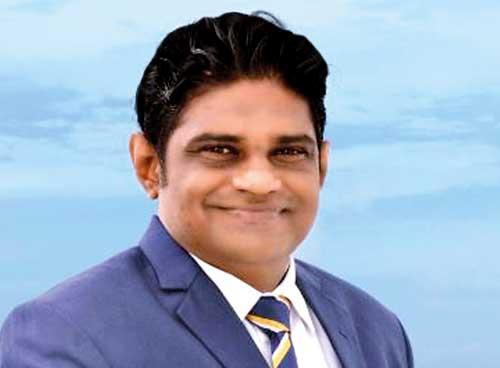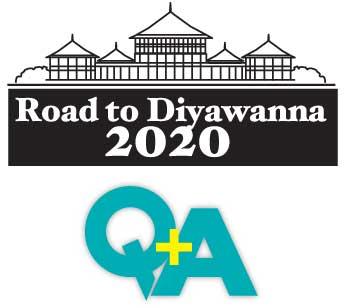27 Jul 2020 - {{hitsCtrl.values.hits}}
Rushdi Zarook is a lawyer and first-time candidate for the Colombo District representing the newly-formed  National Development Front (NDF) led by entrepreneur Rohan Pallewatta. Mr Zarook spoke to Daily Mirror on many issues, including the economy, rule of law and voter responsibility. Excerpts:
National Development Front (NDF) led by entrepreneur Rohan Pallewatta. Mr Zarook spoke to Daily Mirror on many issues, including the economy, rule of law and voter responsibility. Excerpts:
Economy must work for all people
Q What is the main focus of your campaign?
NDF is a new party with a vibrant leader who is a professional and a businessman. We have the vision to take Sri Lanka to a new level of economic freedom. Our main focus is to encourage people to elect persons of honesty, accountability and professionalism. Our main criteria for selecting candidates is based on this.
Q Speaking of economic freedom, what about economic justice?
The economy should work for all people. In an equal economy, every worker must have rights. Our current laws cover workers’ rights, but they are not properly implemented. For example, we have the EPF and ETF Acts, but some employers bypass these and find short cuts and loopholes. But legally speaking, workers are entitled to benefits. So if laws are enforced, workers can have economic justice.
Q The NDF manifesto opposes discrimination based on race, religion, sex etc. What is your stance on
LGBT rights?
LGBT rights is a recent topic that has emerged universally. Our laws criminalize same-sex relations. The NDF stance is that each person has the freedom to live according to how they wish. There is nothing wrong in LGBT rights if it does not encroach on another person’s freedom.
Q You also talk about our duties and responsibilities towards the country. What do you mean by this?
Leaders must uphold their election promises. We must change the political culture where politicians say various things to come into power and then forget about them. Even the people forget politicians had made such promises. This keeps getting repeated over and over again. Instead, if people voted for politicians based on their merit and track record rather than on populist theories, we could elect more professional people who can offer something substantial.
Q What are the duties and responsibilities of citizens?
They say people get the leaders they deserve. When citizens vote, they should think about whether they are voting for someone who can offer something to the country. Our message to the people is to adopt a more rational approach to voting, so we can eliminate the bad eggs and have better political representation. Sometimes the older generation’s voting and thinking patterns influence us. But if we can change the culture of voting for populist theories rather than for capable leaders, we will eventually have a good team governing the country.
Q What other social, economic and cultural problems do you see?
Our public administration needs improvement. Currently, it does not function to its fullest capacity. Public officials  are not appraisal driven like in the private sector. The public sector must be made more efficient and professional.
are not appraisal driven like in the private sector. The public sector must be made more efficient and professional.
Q President Gotabaya Rajapaksa has said he wants to make the public sector more professional and end corruption. Is he on the right track?
If he implements everything as planned, with support from his government, he could achieve what he wants to. But whether they are on the correct track is questionable. Can the President ensure efficiency, professionalism and anti-corruption in the public sector with the same set of people?
Q What improvements would you recommend for the public sector?
Public sector officials must be given key performance indicators and key areas to cover similar to the private sector. Currently, they have no targets. Promotions are made on seniority or through political connections. The public sector can be made more efficient by adopting the target and incentive-based methods of the private sector. That would make people more driven.
Q But isn’t there a clash with the public sector being more service-driven whereas the private sector is more profit-driven?
Take for example the telecom sector, which is service driven. It was partially privatized making SLT more efficient. But their public service has not deteriorated. The public sector can be made profit-driven, but with checks and balances. Being profit-driven doesn’t mean you rip off the masses.
Q How can our agricultural sector be made stronger?
We have a strong agricultural economy. But it must be restructured from the farmer to the consumer. The NDF wants to see farmers earn more profit for their produce.
Q What about the middle-man who comes between the farmer and consumer?
We need laws to restrict the middle-man. Successive governments have tried introducing policies, but none were backed by laws. Laws can impose a maximum percentage of profit for middle-men, and a minimum price for farmers. Through this, farmer exploitation can be curbed.
Q The ruling party is seeking a two-thirds majority to change the Constitution. How do you see this?
The government in the guise of getting a two-thirds majority is trying to reintroduce something similar to the 18th Amendment. Successive governments under the 1978 Constitution came into power advocating a change of the Executive Presidency. Now I feel we have a balanced Constitution, and the President’s powers are controlled. But the ruling party is seeking two-thirds, and not telling the people what amendments they intend to bring. This is wrong. If they are seeking a two-thirds majority, the people must know what they intend to do. In the past, we saw what governments did with such a majority. So I don’t think it’s a good idea for people to consider giving a two-thirds majority.
Q Your party backs non-aligned and non-confrontational diplomacy. Is Sri Lanka vulnerable to debt-trap diplomacy?
Our debt crisis has been ongoing over successive governments which kept borrowing and increasing the quantum of debt. There is no overnight solution for this debt crisis. We need a controlled method of solving it. We can utilize our natural resources to increase productivity and income, and thereby minimise the amount we borrow. For some projects we could use foreign aid, but with restrictions favourable to us.
Q But international funds come with conditions.
Foreign donors may have ulterior motives and agendas. They will also not accommodate everything we want. But we must negotiate for favourable and balanced conditions for Sri Lanka.
Q On a similar note, what is your position on the ACSA, SOFA and MCC agreements?
ACSA was signed in 2017 and is renewed every ten years. As it’s already in place there are limitations under international law for the new government to change it. SOFA questions our sovereignty by allowing US personnel to move around with weapons. We do not agree with this.
MCC, on the other hand, is a US aid-driven project that has selected Sri Lanka as being eligible for aid. They want to digitize title registrations and support infrastructure development. At this stage, the US$ 480 million on offer is useful to Sri Lanka. If left to us, digitizing title registrations won’t happen for the next twenty to thirty years. We also need infrastructure development. So I think the MCC agreement is good.
Q Illegal sand mining, deforestation and threats to wildlife are rampant. What is your approach to conservation?
There are strict environmental protection laws in place. But sand mining and deforestation happen behind the eyes of the law. These are punishable by law. But yet some groups continuously engage in them. If the law is strictly implemented, regardless of the connections or positions of offenders, this issue can be easily countered.
Q Your manifesto also notes Sri Lanka has untapped resources and potential. Can
you elaborate?
We have a high literacy rate compared to the rest of Asia. So we can enhance our literate and intelligent population to develop the IT sector. India, for instance, has a strong IT sector which is embedded in their education system as well. Also, many western countries prefer Sri Lanka for Business Process Outsourcing because our English language skills are better than other South Asian countries. We can harness our potential for this demand as well.
Q Any remarks on the election campaign?
This is a one-sided election, with one group going for a two-thirds majority. The opposition is split and fighting among themselves for votes. I would advise people not to vote for anyone who has committed wrongdoings, stolen, or made promises and not delivered. I reiterate, our main principles are honesty, accountability and professionalism. Vote for someone with these qualities.
10 Jan 2025 6 minute ago
10 Jan 2025 22 minute ago
10 Jan 2025 37 minute ago
10 Jan 2025 42 minute ago
10 Jan 2025 1 hours ago